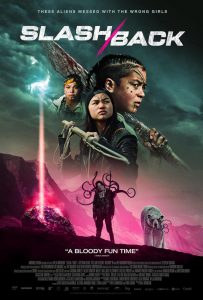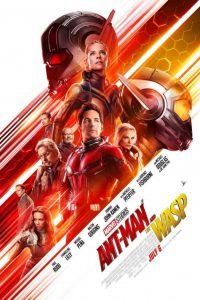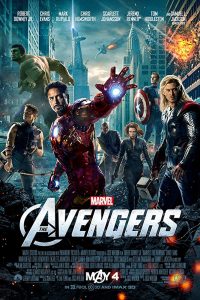Power to the People and the Beats: Arley Sorg and Josh Pearce Discuss Neptune Frost
 Actor, poet, activist, and musician Saul Williams writes and co-directs (with Rwandan filmmaker Anisia Uzeyman) Neptune Frost. Variously described as an Afrofuturist-cyberpunk-scifi-musical*, the film certainly defies expectations and easy categorization.
Actor, poet, activist, and musician Saul Williams writes and co-directs (with Rwandan filmmaker Anisia Uzeyman) Neptune Frost. Variously described as an Afrofuturist-cyberpunk-scifi-musical*, the film certainly defies expectations and easy categorization.
Neptune Frost connects to Williams’s “Martyr Loser King” multimedia project—originally envisioned as a graphic novel and stage play—which also includes his 2016 studio album. The plot centers on Burundi coltan miner Matalusa (Bertrand Ninteretse), who forms a romantic relationship and hacker collective with Neptune (Cheryl Isheja/Elvis Ngabo) to overthrow the oppressive, capitalist system.
Arley: I felt like this was poetry, like watching a movie that is also a poem. Some of it isn’t meant to be intellectualized, it’s meant to be understood on the emotional gut level. But there’s also an intellectual conversation going on, at the same time. From the very beginning, you have an immediate, strong theme of exploitation and notes of grief, these parallel thematic elements between the two main characters, and they both respond to their situations in the same way, which is to leave. To undertake a journey. Unlike Wakanda Forever, where I knew where the story arcs were going, in this one I had no idea what was coming next, moment-to-moment. I was just there for the ride, and that reshaped my approach to it, and my expectations.
Josh: I’ve actually been a fan of Saul Williams since college. I still have a bunch of his books, I’ve seen him perform a couple times. So when I saw that he was doing a science fiction movie, I was like, “Great! Let’s check it out.” The beginning of the film was a really hard barrier to entry, though, like a dream sequence, and if the whole movie ended up being that abstract, I wouldn’t know what to do with it because I had a hard time following. But I eventually started to catch on, and then I really enjoyed it. It’s a huge upfront investment.
Arley: I love the music. I love the poetry. It’s really weird, because I’m very picky about music, but in the moment, the music provided a powerful throughline. Later in the movie, there’s a line where somebody asks, “What is this place?” and another character explains what it is and then says, “The way to get here is through music.” It just tied the entire film together, from the beginning, because even in that initial scene when the brother dies, the miners are all singing together. I kept having these moments where things kept coming together, but there also were moments where I’m like, “I’m not sure what’s going on, but I’m still getting an emotional impression of what’s going on.”
Josh: The music was not what I expected—the song in the big rave scene was what I thought the whole movie would be like from the description of a “Saul Williams scifi musical.” But a lot of it was people repeating the same line, or singing some lines of dialogue with no background track, and it didn’t seem to be tying into what was happening, at first. But then it kicked into that big song at the collective, which I thought was great.
Arley: I really liked that there’s an intimacy to a lot of the musical scenes. Usually music in movies or shows feels very produced. But a lot of the moments here feel like, you know, this character is just singing to themselves, the way I would when I’m alone. And we’re just following along. When it becomes basically a rave and they have that song and he’s rapping about gender and resistance, I was literally smiling, and I just wanted that scene to keep going. I was like, “This is the emotional impact that scene in The Matrix Reloaded was going for.” I was swept up in it. Engaged with it. Paying attention. I was caught up in this movie from the start, really, and excited by seeing something so different.
Josh: Yeah, that rave scene, I think, was my favorite part of the movie, too.
Arley: So awesome. Everybody is fucking vibing.
Civil unrest at the time prevented the film from being made in Burundi, so production moved to Rwanda instead, with much of the cast and crew hired locally. Williams says that, because there were no equipment rental facilities, “Everything you see in Neptune Frost was built by the crew”—the lighting rigs; sandals made out of motherboards; jackets made out of computer keyboards; an Old Testament angel represented with bicycle wheels within wheels.
Josh: The keyboard jacket was super cool.
Arley: I also liked the lack of costumes, the moments of like, this is just what ordinary people wear, what they look like. In movies, you sometimes forget that pretty much everyone is dressed up by the production company, that what you see isn’t real. When you watch Neptune right after Wakanda Forever, you realize what an exaggeration that film is, and in what ways.
Josh: Especially comparing Neptune Frost to a big-budget Marvel movie is unfair—that’s just two completely different things.
Arley: I think some aspects warrant thoughtful comparison, especially since Wakanda Forever is ostensibly set in “Africa” and is trying to create a specific type of vision. But it is ultimately an American product. Even though it’s many miles better than most – well-researched, as well as heavily influenced by and involved with people who have close ties to African countries – it’s still an American vision of a fictional “African” nation, so I think comparing it to actual African productions can have value. The bigger problem is, there aren’t a lot of major SFF films which center Black characters, let alone featuring a mostly or an all-Black cast.
The low-budget ingenuity is perfectly in keeping with the hacker aesthetic. While many “cyberpunk” movies and shows have outdated effects and an understanding of computers that is rapidly obsolete, Neptune Frost‘s limited computer graphic sequences have more of an ’80s and ’90s nostalgia feel for those fans of the subgenre’s nascent days: the cassette-recorder-and-payphone tech that passed for cutting edge in Neuromancer, Hackers, and Max Headroom.
The hacking sequences themselves, as well as the overall worldbuilding, are kept concealed behind enough metaphor that you can never quite accuse the film of being unrealistic. In Neptune Frost, as in old-school cyberpunk, there’s no separation between the internet and the mind, and there’s no separation between the mind and the body. The exploited laborers are mining coltan, a mineral that goes into the power unit of many modern electronic devices, and the characters say that their blood goes into this technology—their blood goes into a network of exploitation (which is synonymous with the global technology network). Thus, one can be hacked by hacking the other.
The metaphors may be tenuous, but it makes an overall poetic sense.
Arley: There’s another sub-theme of war, the consequences of war, and the use of war as a capitalist tool. You don’t see the war on the screen, but you feel the impacts of it and the fear of war.
Josh: Yeah, and they’re using drones, directly using technology to wage war. So these people are probably mining the very components that go into these machines being used to kill them.
Arley: Until later in the movie, I wasn’t sure how much was metaphor and how much was literal. I’m like, “No, this character really is the motherboard. Literally!” I love also the theme on gender nonconformity.
Josh: I noted “non-binary” as in gender, but also as in an exploit or disruption of binary computer code. So, again, it’s a poetic metaphor, but they’re also literalizing it. But also I don’t know how to describe it.
Arley: I also felt that there was an underlying theme on the transformative power of death. For example, through death Neptune becomes their more idealized version, becomes who they really are. Would you recommend this movie, and who would you recommend it to?
Josh: Yeah! I’ve already recommended it. I’ve got a buddy who’s a film nerd, and he asked me how it was and I said definitely worth watching. You just have to pay a lot of attention in the beginning. There’s a lot going on in this movie and it’s not mainstream, so you kind of have to judge your audience. You?
Arley: I like pretty much everything about this movie. There are a few moments where I was actually smiling, and there were a few moments where I was swept up in it. I didn’t have the same kind of emotional response to it as I might have had for some other movies. It was more of a quiet journey, emotionally and intellectually engaging, with peak connection being the rave. But overall I was like, “Holy shit,” you know? This was also really cool from a language standpoint, because they would slip into different languages, depending on the character, depending on the circumstances, depending on the word.
Here, then, is proof: we don’t need Hollywood stars to have engaging characters; we don’t need CGI to create a visual feast; we don’t need a big budget to tell a story. We can hack together something great with whatever’s on hand, with whomever is willing.
*Emphasis on “this is how it’s been described”. Neptune Frost is more properly Africanfuturism.
Directed by: Anisia Uzeyman & Saul Williams
Written by: Saul Williams
Starring: Cheryl Isheja, Elvis Ngabo, Diogène “Atome” Intarindwa, Bertrand “Kaya Free” Ninteretse, King Kivumbi, Robert Ninteretse, Eric “1Key” Ngangare, Natacha Muziramakenga, Deogratias Munyakazi, Eliane Umuhire, Rebecca Mucyo, Dorcy Rugamba, Cécile Kayirebwa, Trésor Niyongabo, Michael Makembe & Ekaterina Baker
 slash/back: Arley’s Short Take
slash/back: Arley’s Short Take
I watched slash/back* on the plane coming back to California from Can*Con, and I’m very glad that I did. It’s a slightly pulpy alien invasion film set in a very rural town in Pangnirtung, aka Pang. The girls of Pang are the heroes – they discover the alien menace, and decide to stand against them, defending their town and saving as many people as they can. The acting is on point with a number of standout moments. I really liked the fact that they weren’t “just add water” heroes; the fight was fun but it wasn’t necessarily easy. That said, hunting is the norm for folks here, so there is a level of capability baked into the story, which I also liked. Banter adds welcome humor and creepy moments add to the entertainment. Let’s be honest: some of the special effects weren’t that great. But this adds to the pulp or maybe slightly camp feel. Functionally, the aliens resemble zombies in some ways, seeking bodies to infest, which then become fairly clumsy but still lethal. The alien invasion is a set up for a cool narrative about strong girls, and everything about this aspect of the film is thoughtful, deliberate, and truly exciting to see. There are some underlying sociopolitical themes and critiques, which I thoroughly enjoyed, as well as a number of beautiful and even thought provoking shots. The film is Nyla Innuksuk’s directorial debut, and it intentionally centers young people in the Inuit community. So it’s a fun movie, yes, but it’s also an important and historically significant movie. I hope it finds as many viewers as possible, and I hope Innuksuk has more in store for us.
*upper case on IMDB but lower case on Innuksuk’s Mixtape site.
Directed by: Nyla Innuksuk
Written by: Ryan Cavan & Nyla Innuksuk
Starring*: Tasiana Shirley, Alexis Vincent-Wolfe, Nalajoss Ellsworth, Chelsea Prusky, Frankie Vincent-Wolfe, Shaun Benson, Kristian Bruun
*Oddly, IMDB gives adult men the top billing, despite that this film deliberately centers girls, and that the order is completely different on pages by production companies and on the poster – we often follow IMDB, but for this one, I decided to follow the order on the poster.

JOSH PEARCE has stories and poetry in Analog, Asimov’s, Beneath Ceaseless Skies, Cast of Wonders, Clarkesworld, IGMS, Nature, and more. Find him on Twitter: @fictionaljosh, or at fictionaljosh.com. One time, Ken Jennings signed his chest.
ARLEY SORG, Senior Editor, has been part of the Locus crew since 2014. Arley is a 2022 Kate Wilhelm Solstice Award recipient. He is also a 2021 and 2022 World Fantasy Award finalist as well as a 2022 Locus Award finalist for his work as co-Editor-in-Chief at Fantasy Magazine. He is a 2022 Ignyte Award finalist in two categories: for his work as a critic, and for his essay “What You Might Have Missed” in Uncanny Magazine. Arley is Associate Editor and reviewer at Lightspeed & Nightmare magazines, columnist for The Magazine of Fantasy and Science Fiction, and interviewer at Clarkesworld Magazine. He grew up in England, Hawaii, and Colorado, and lives in the SF Bay Area. A 2014 Odyssey Writing Workshop graduate, he can be found at arleysorg.com – where he has started his own “casual interview” series with authors and editors – as well as Twitter (@arleysorg) or Facebook.
 While you are here, please take a moment to support Locus with a one-time or recurring donation. We rely on reader donations to keep the magazine and site going, and would like to keep the site paywall free, but WE NEED YOUR FINANCIAL SUPPORT to continue quality coverage of the science fiction and fantasy field.
While you are here, please take a moment to support Locus with a one-time or recurring donation. We rely on reader donations to keep the magazine and site going, and would like to keep the site paywall free, but WE NEED YOUR FINANCIAL SUPPORT to continue quality coverage of the science fiction and fantasy field.
©Locus Magazine. Copyrighted material may not be republished without permission of LSFF.






